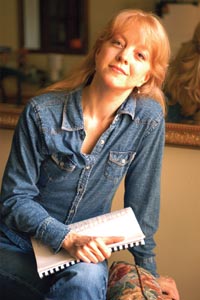

Alumni Gazette
Who Needs Record Stores?
 |
| GRAMMY FIRST: Schneider won without selling her CD in stores. (Photo: Elaine Criscione) |
Maria Schneider ’85E (MM) earned more than
a Grammy with her most recent album.
The jazz composer also got schooled in how accounting works in the music business,
and, more important, how to devise a new model to make the dollar figures add
up in her—and other musicians’—favor.
“Music is a business,” Schneider says. “And there would be no business without the artists who make the music, but they are the very last ones in line when it comes to making money. Everyone else in the process is guaranteed a profit.”
Schneider turned the typical process of financing and making an album on its head with the production of her 2004 CD Concert in the Garden. The album, which won the Recording Academy’s award for best large jazz ensemble last February, is believed to be the first to win a Grammy without selling a single copy in stores.
Schneider sold the album through an Internet-based consortium of musicians called ArtistShare that asks fans to help underwrite recording costs by giving them access to the people who make the music. Depending on the level of support, fans who visit the Web site at www.artistshare.com can watch streaming video of an album’s production, listen to lectures presented by performers, or download copies of scores.
Those who just want to buy an album can do that, too, but they have to make the purchase online. They can’t buy it in stores—what ArtistShare calls “anonymous sales.”
Schneider says she has more than recouped her $30,000 investment to produce the CD, something that she didn’t manage for previous albums.
“[The success of the CD] really is the first sign that the gatekeepers of the recording industry are not necessary anymore,” Schneider says.
Schneider also says she’s gratified that Concert in the Garden is getting recognition because she thinks it represents some of the strongest work of her career.
The three compositions on the album were each commissioned by different organizations over the past few years, and the music includes voice parts, accordion, and other new elements for Schneider.
“That’s what makes the whole thing fun: to have this happen with my best work,” Schneider says. “That makes me really happy.”
—Scott Hauser
